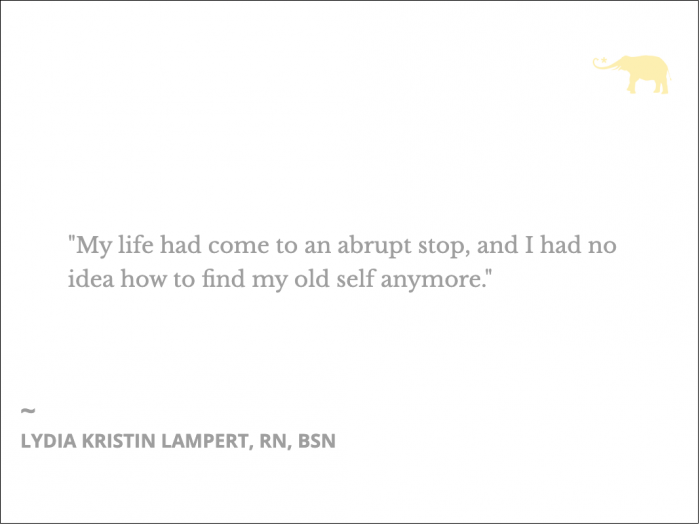For me, January 12, 2015, seemed as good a day as any to die.
I dropped my sons at school, then veered onto the gravel road, the one where I would go to hide and chain-smoke my cigarettes. I parked by the creek and just sat in my minivan, drowning out the voices in my head by blasting angry 90s grunge music.
The voices terrified me. They were winning the argument within my mind.
I stared into the woods that ran along the water, expressionless, and void of any positive feelings. I was numb and fixated on ending my pain. I remember gazing out the rapidly fogging windshield and realizing I could just wander off into the woods and disappear.
I found comfort in knowing that by the time someone found me, it would be too late. The voices reminded me that my disappearance would spare my family the horror of discovering my lifeless body, reassuring me their plan would work.
I was obsessed with an exit, an escape, and an end to the torturous pain in my chest that felt as if someone was ripping it apart with their bare hands.
I was at one of the lowest points I have ever been in my life. It took all the strength I could muster to get out of bed and prepare a meal for my family, a meal which I would push around my plate and never eat.
I was out of work and collecting temporary disability since I could not get “unstuck” from the traumas currently flooding my body. The previous fall, every traumatic situation I had compartmentalized throughout my life had been unlocked and released which was the result of a secondary trauma my family had experienced.
Mentally, I had become paralyzed and unable to process anything. Physically, I was present, but my mind had checked out.
I spent my days on the couch, under piles of blankets, and covered in my hoodie. I hid from everything and everyone in my world. The blinds were tightly closed so that I could escape hours at a time, binge-watching reruns of “Criminal Minds” or “Law & Order: SVU.”
My life had come to an abrupt stop, and I had no idea how to find my old self anymore.
Anyone who would ever meet me today would have a hard time believing this Lydia ever existed, but she did. The scariest part for those who suffer from post-traumatic stress disorder (PTSD) and depression is that there is no cure.
As much as I fight this battle every day and do everything I possibly can to care for myself, the risk for exacerbation will always exist. Somewhere along the way, I could potentially face another unleashing moment in my life, which could rock my stability once again.
In 2015, I was in a constant state of fight or flight. I couldn’t eat or sleep. My exit from this earth appeared to be an easier option than fighting back against my past traumas. And on that January morning, I realized my obsessive daydreams of suicide would become a reality if I didn’t seek help immediately.
The intense darkness of my PTSD and depression was kicking my pale, malnourished ass, and I am thankful that God helped me realize that despite my exhaustion, I was still worth the fight.
I drove home immediately and called my mom to sit with me as I searched for a psychiatric hospital where I could voluntarily admit myself. I had resisted suggestions to go long enough.
I had been down this road one other time in my life. It was following the first anniversary of my son Michael’s death. In June of 1995, my PTSD was also winning. I could not control the anxiety and traumatic response any longer and sought voluntary admission. The terrible memories created during my first experience presented a significant obstacle to inpatient treatment for me this time.
I swore I would never go back to a place like that again. Yet, here I was, 20 years later, making a similar call.
Later that night, as I waited for my bed at Princeton House the next day, I wrote in my journal about the voices. I described them as “relentless motherf*ckers who would never shut up.”
And that “every f*cking waking minute, they were in my ear and no matter what I did, no matter what medication I tried, they would not stop.” By the time I decided to make that call to the hospital, I had thought of more ways to die than I can even remember.
I thought about it every time I pulled my car into the garage.
The evil voices would prompt me to lower the door and drift off to sleep. They tried to coerce me by telling me it would be painless, almost beautiful. I also remember standing on my deck day after day, smoking my cigarettes, and staring at the apple tree, as the evil voices tried to persuade me to hang myself there.
“Who cares?” they would whisper in my ear, “You’ll be dead anyway.”
The persuasiveness of that suggestion still makes the hair on my forearms stand on end.
You see, depression has the power of a religious cult leader. The influence of the disease alters a person’s perception and beliefs. We become isolated from all of those we love because we only hear its voice. Depression confirms the pain we feel is unbearable and promises solace if we just cross over to the other side.
Even the strongest of minds believe their lives are irreparable when depression takes hold of them. It is hard to fathom the power depression wields unless you have been there, but I can attest to its strength.
Depression and PTSD had been chasing me all my life, but back then, at 43 years of age, it finally caught me.
A few months ago, I had my worst fears confirmed when I learned an old friend succumbed to the demons of her depression. My heart agonized for her and her family.
I wish I could say I was astounded. When I read the vague obituary weeks earlier and noted the limited discussion of the death on social media, I suspected there was more to the story. We hadn’t spoken in several years, but I was in disbelief that the person I knew back then was capable of taking her own life.
But then again, isn’t that exactly how depression works? It strikes those we would never expect. Strong people. Vibrant people. Funny people. Smiling people.
The fact of the matter is suicide does not discriminate.
And in the aftermath, everyone stands around, shaking their heads in disbelief, and swearing they would have done more if they only knew.
Friday, September the 10th, is World Suicide Awareness Day.
As a woman who evaded her death by perhaps a mere day, I decided to tell my story, but I also wanted to provide some chilling data to raise awareness.
Did you know that “women with post-traumatic stress disorder (PTSD) are nearly seven times more likely than other women to die by suicide?”
Sit with that for a moment. Process its significance.
Women are seven times more likely to die by suicide if they have PTSD.
The researchers found that this disturbing statistic may be related to the cause of one’s PTSD. For example, a woman with PTSD may be more likely to commit suicide if they were a victim of a sexual assault. The research also suggests that women with PTSD are more likely to commit suicide based on the differences in treatments they receive and their perceptions of trauma compared to men.
I understand how a woman could get to the point where death seems a better option than living in excruciating pain anymore. I listened as the depression fed me lies that my family would be better off without me. I believed depression when it told me I was causing so much pain for them and that my friends were tired of trying to help me.
My old personality was gone, and depression convinced me that she was never coming back. To disappear seemed the only option back then, but now I know that is untrue. I can assure you of this because I was ready to die on January 12, 2015, but here I am, almost seven years later!
Although I found the motivation to seek help through my family, I realize not everyone is so fortunate. I want to speak to them.
I want to talk to the person who’s sunken so deep that they feel isolated, alone, and helpless.
Please, read my words.
Hear my voice assuring you, as I say:
I feel your pain. I understand what you are going through. Believe me when I tell you that you are worth it. You alone are worth it. You don’t need any other motivators besides yourself because you are amazing. I know you may not see it now, but you are in there and deserve a chance.
The unique person that is you, the one hiding behind all the pain and darkness, is worth the fight. Please don’t give up. Fight because it will be worth it. Don’t let the depression and darkness win.
Tap into the fighter in you. Look at you!
You are still here. You are stronger than you know, and you deserve to find happiness.
I miss my friend. I wish I had said these things to her, but now it’s too late. I cry each time I think about the fact that I could have been her.
Unfortunately, death does not grant second chances.
So I beg of you, in her honor, let us:
>> Fight to stop the stigma against mental health.
>> Raise suicide awareness to save lives.
>> Always show compassion.
We never know the battle someone is fighting. Be kind and genuine, for the way you treat someone may save their life.
~
Resources:
If struggling with suicidal thoughts, please call the National Suicide Prevention Hotline: 1-800-273-8255












Read 29 comments and reply